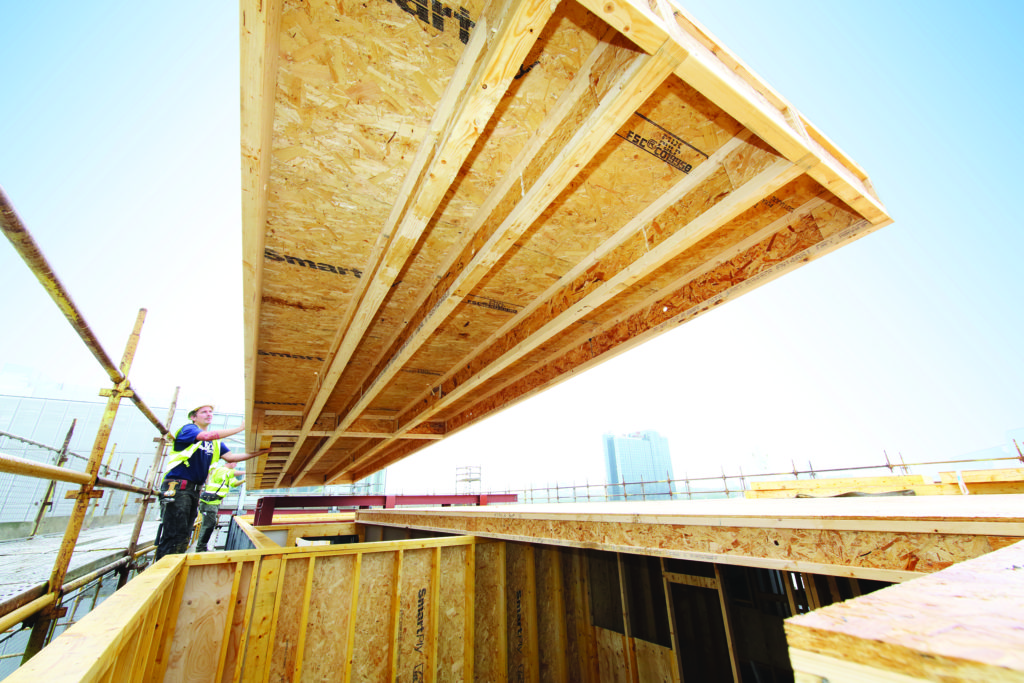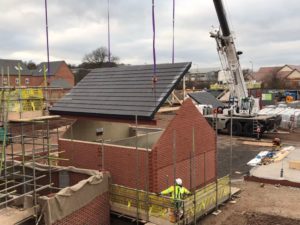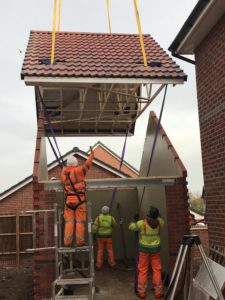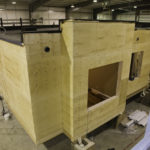News - Construction News
Driving performance in housebuilding through technical innovation
27 Aug 18

In this article, we speak with Oliver Novakovic, Technical and Innovation Manager at Barratt Developments Plc, about the changes underway in house construction and what the future holds.
As the UK’s largest and best-known housebuilder, one of our core business priorities is to lead the industry through our approach to innovation and new building methods. If housebuilding wants to be able to deliver more homes whilst maintaining the highest safety and quality standards, it needs to embrace the best new methods of both onsite and offsite construction. Or, as the 2016 Mark Farmer report put it rather more succinctly, “Modernise or Die”.
Another equally important reason for investing in modern methods of construction (MMC) is to help address the current skills shortage. As the interim report in June from Sir Oliver Letwin pointed out, the industry urgently needs another 15,000 bricklayers to be trained over the next five years. Put simply we need more people to join the industry, particularly if we are all going to stand a chance of hitting the government’s 300,000 homes target.

Which is why in 2014 we set ourselves the target of having 20% of our housing output contain an element of offsite construction by 2020. Over a two-year period we evaluated over 150 different suppliers and technology types. We are now trialling a variety of MMC, all of which will help us change our build profile in different ways. Whilst there are pros and cons to each of the systems, they all help us to reduce our reliance on particular trades, speed up build times, improve safety and, when used at scale, maintain efficient costs.
The most widely used of these is timber frame construction, which we will use to build over 1,600 homes in 2018. Using timber frame has increased our build speed and changed our labour demand profile. In particular, it changes the demand profile for bricklayers, enabling the existing bricklaying labour pool to operate more efficiently, so helping increase overall build volumes. Timber frame construction is actually one of the oldest methods of building a home, accounting for around 20% of the homes being built in the UK, and is fully covered by the NHBC standards and mortgage providers. However, its use is extremely regional. Nearly every new home in Scotland is built using timber frame, whereas in England its usage, while growing, is still much less common.
We are also looking closely at large format block construction. We recently hosted Secretary of State Sajid Javid at our site in Banbury for him to see the system, which consists of large format blocks that are 15 times larger than traditional blocks, with an integrated floor, wall and roof. The blocks create a watertight, inner-leaf shell using the same material as aircrete blocks, and are fixed using a thin mortar joint system. We are currently looking to roll this technology out across six of our divisions in the Midlands and South West, and just like timber frame methods, it enables us to speed up construction whilst reducing the amount of labour needed to build the homes.
The third main method we are actively trialling is light gauge steel frame construction. We have recently finished a successful trial project with Fusion Building Systems at our development in Cane Hill near Croydon, where we constructed social housing and private for sale apartments using this method. We are now further trialling the Fusion system with more of our divisions. As Mike Fairey, Fusion’s director, said: “The UK housing shortage is no secret and with building sites suffering a decline in available skilled workers, offsite construction is one way developers can ensure their build programmes deliver homes on time and on budget.”
Despite the success of these methods, we have not stopped there. We have previously hosted a ‘Barratt Innovation Challenge Sandpit’. A ‘Sandpit’ is an approach to supplier engagement which allows direct dialogue between our business and suppliers of exciting future technologies through a day of interactive workshops. The aim was to pool ideas for technology and process innovations that drive cost, quality and speed benefits whilst looking to use diverse skill sets. Among the ideas mooted were onsite safety solutions, alternative insulation applications and prefabricated masonry walling systems. At the end of the day we selected five products to be taken to an initial product review. One of these, an offsite flooring system from a company called Nu-Span, has already been installed on over 2,500 of our houses.
In total over the past four years we have looked at over 150 innovative systems, the majority of which have been offsite technologies. We have applied over 17 innovations on sites with our divisions, of which we are currently trialling or rolling out 12 more widely across the business.

A group of our board directors and senior managers have also just returned from a European research trip to study offsite manufacturing techniques and new housebuilding technologies in countries that have parallel housing demand profiles and similarities to the UK. The group toured Holland and Germany, visiting Streif (to look at advanced timber systems in panelised format), Ursem in Holland (to look at volumetric modular buildings) and dBRG (to look at large format concrete). Such research trips are beneficial in that they push us to think differently. It helped us to validate some of our technology choices and reinforced our overall approach to MMC and offsite construction techniques.
As our chief operating officer, Steven Boyes, said: “As the UK’s largest housebuilder we like to think we lead the housebuilding industry in this area, not least because of the breadth of technologies we are actively trialling and the strength of our supply chain relationships. Our move to embrace offsite technology is also based on addressing the long-term skills shortages that we are seeing in the UK housing sector and is intended to help ensure predictability of build cost and programmes. It’s vital that all of the technologies we use and offsite supply chain partners that we select can work with us effectively to deliver the high quality that we need.”
Ultimately, the benefits of these technologies are maximised when they complement, rather than replace, traditional construction methods. By investing in these modern methods of construction now we are hopefully making ourselves more resilient to deliver the high quality homes the country needs in the future. In the middle of a housing crisis where the industry is attacked for not building enough, that can only be a good thing.
If you would like to read more articles like this then please click here.
More News
- £8Bn to be invested in flood defences over the next decade
27 Jun 25
A record £7.9Bn over ten years has been committed to flood defences.
- Boosting British jobs and skills key for firms to win major infrastructure projects
26 Jun 25
Creating high quality British jobs and boosting skills in local communities will be key requirements
- Major rail supply deal to protect thousands of British Steel jobs
25 Jun 25
Thousands of British manufacturing jobs have been secured as the Transport Secretary finalises a major
-
-
Latest News
- £8Bn to be invested in flood defences over the next decade
27 Jun 25
A record £7.9Bn over ten years has been committed to flood defences.
- Boosting British jobs and skills key for firms to win major infrastructure projects
26 Jun 25
Creating high quality British jobs and boosting skills in local communities will be key requirements
- Major rail supply deal to protect thousands of British Steel jobs
25 Jun 25
Thousands of British manufacturing jobs have been secured as the Transport Secretary finalises a major
- Why early MEP design collaboration holds the key to smarter buildings
24 Jun 25
Working closely is essential to ensure that all aspects of a building’s design contribute to
- ONS statistics show monthly construction output has grown
23 Jun 25
The latest figures released by ONS have suggested that monthly construction output is estimated to
- Solar on all new homes must align with 1.5 million homes target
20 Jun 25
The Government have said that solar panels will be included in the FHS, leading to
-
-






